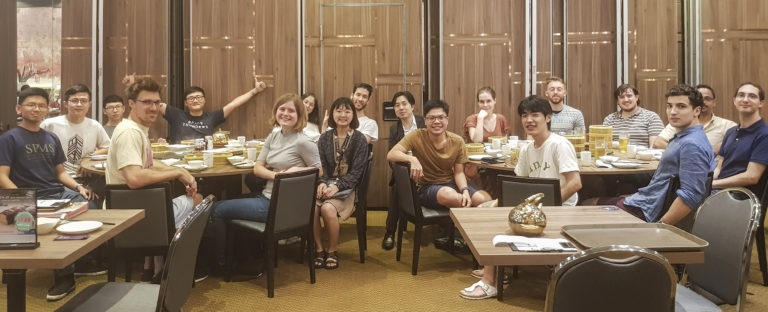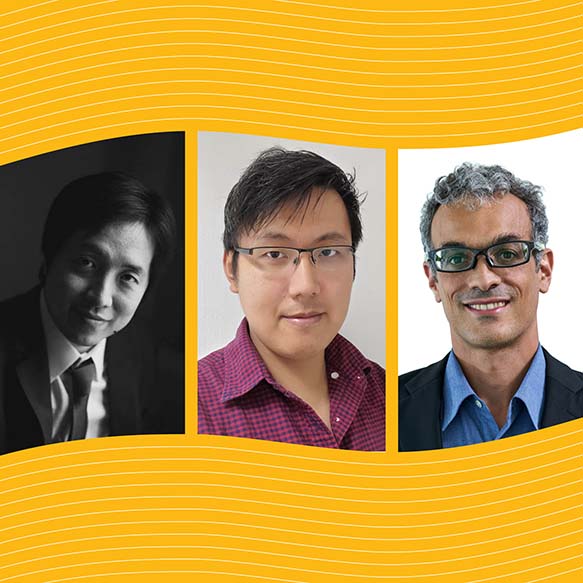Mile Gu Group
Complexity and quantum science may seem to have little in common. One deals with the science of the very large, seeking to understand how unexpected phenomena can emerge in vast systems consisting of many interacting components. The other is typically associated with the mechanics of the very small, focusing on the interactions of individual atoms and particles. However, these two sciences share surprising connections. A system that appears complex to classical observers may appear much simpler to one capable of quantum reasoning [Nat. comm 3 762], while even simple spin systems display emergent macroscopic properties [Nature 459, 332-334]. In fact, both fields share a common language of information theory and employ tools to describe complex adaptive systems. They also require vast amounts of data to model and provide theoretical foundations for understanding the ultimate limits of what intelligent agents can accomplish.
The Quantum and Complexity Science Initiative aims to further explore this symbiotic relationship. Our research naturally encompasses a cross-disciplinary approach, spanning various areas of research that intersect these two sciences. We ask questions such as: What are the key features of the past that are necessary for agents to adapt to complex environments, and how do these features change in the quantum regime? How can we employ machine-learning techniques to learn the causal relations within complex adaptive systems, and how can these techniques be enhanced in the quantum regime? Can quantum agents better sense and adapt to their environments? What complex games can quantum devices play with reduced resources, whether in terms of speed, memory, or energy? How can we describe complex spatiotemporal quantum correlations, and when do these correlations behave in ways that have no classical counterpart?
More information at our homepage: http://www.quantumcomplexity.org/


Associate Professor
School of Physical & Mathematical Sciences - Division of Physics & Applied Physics, Nanyang Technological University
Mile Gu is originally from New Zealand and obtained his PhD at the University of Queensland in 2009 under supervision of Michael Nielsen, after which he joined CQT as a Research Fellow. After a faculty position at Tsinghua at the Institute for Interdisciplinary Information Science as a China 1000 Talent in 2013, he returned to Singapore in 2016 as Singapore’s National Research Foundation Fellow. He presently leads the quantum and complexity science initiative – focusing at topics bridging quantum, complexity and information science, and holds joint affiliations with Nanyang Technological University, the Centre for Quantum Technologies and MajuLab.
Group Members

- Mile GuCQT Fellow
- Ranjith NairPrincipal Research Fellow (NTU)
- Graeme Berke Research Fellow (NTU)
- Keith NgResearch Fellow (NTU)
- Travis BakerResearch Fellow (NTU)
- Ximing Wang Research Fellow
- Yang ChengranResearch Fellow
- Amalina Lai Shan ShanPhD Student (NTU) & NPGS Scholar
- Huang Ruo Cheng PhD Student (NTU)
- Isha Singh Le Xue PhD Student (NTU)
- Tham Guo YaoPhD Student (NTU) & NPGS Scholar
- Chen JianjunPhD Student (NTU)
Recent papers

- Guo Yao Tham, Ranjith Nair, M. Gu. (2024). Quantum Limits of Covert Target Detection. Phys. Rev. Lett. 133 110801

- Kang-Da Wu, Chengran Yang, Ren-Dong He, M. Gu, Guo-Yong Xiang, Chuan-Feng Li, Guang-Can Guo, Thomas J. Elliott. (2023). Implementing quantum dimensionality reduction for non-Markovian stochastic simulation. Nature Communications 14 2624

- W.Y Suen, Thomas J. Elliott, Jayne Thompson, Andrew J. P. Garner, John R. Mahoney, Vlatko Vedral, M. Gu. (2022). Surveying structural complexity in quantum many-body systems. Journal of Statistical Physics 187 1-18

- Xiaodong Yang, J. Thompson, Ze Wu, M. Gu, Xinhua Peng, Jiangfeng Du. (2020). Probe optimization for quantum metrology via closed-loop learning control. NPJ: Quantum Information 62

- Farzad Ghafari, Nora Tischler, Carlo Di Franco, J. Thompson, M. Gu, Geoff J. Pryde. (2019). Interfering trajectories in experimental quantum-enhanced stochastic simulation. Nature Communications 10 1630

- Varun Narasimhachar, J. Thompson, Jiajun Ma, Gilad Gour, M. Gu. (2019). Quantifying memory capacity as a quantum thermodynamic resource. Phys. Rev. Lett. 122 060601

- Felix C. Binder, M. Gu, J. Thompson. (2018). Practical unitary simulator for non-Markovian complex processes. Phys. Rev. Lett. 120 240502








